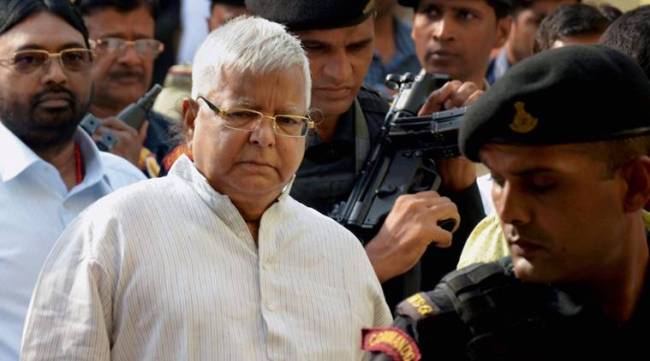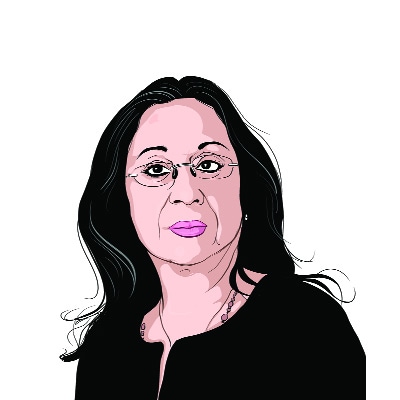Opinion Fifth Column: A bad week for corrupt politicians
One way to reduce corruption is by ensuring that political leaders do not bring their sons, daughters or wives into politics. The Prime Minister initially tried doing this but recent state elections have seen the advent of many mini BJP dynasts.
 RJD leader and former Bihar chief minister Lalu Prasad arrives at a special CBI court in Ranchi on Thursday connection with the multi-crore fodder scam case. PTI Photo
RJD leader and former Bihar chief minister Lalu Prasad arrives at a special CBI court in Ranchi on Thursday connection with the multi-crore fodder scam case. PTI Photo  RJD leader and former Bihar chief minister Lalu Prasad. (PTI Photo)
RJD leader and former Bihar chief minister Lalu Prasad. (PTI Photo)
What a week! In Pakistan corruption charges felled a powerful prime minister. In Bihar corruption charges felled a powerful political leader. So it was a good week for higher standards in public life, and a bad one for political leaders who become inexplicably rich. Lalu Prasad and sons run a small enterprise compared to Nawaz Sharif and family, and so, did not make the Panama Papers like the Sharifs did. But, it’s basically the same story on both sides of the border. It is a story of political leaders who in the name of public service end up putting their family’s commercial interests above the public good. When Pakistan’s Supreme Court forced Nawaz Sharif out of office, our ‘nationalistic’ TV anchors reported the story gleefully as if this was an area in which India’s democracy made us less vulnerable to the depredations of corrupt politicians. This is sadly not true.
It is a shame that regime change and (ancien) regime restoration in Patna was so melodramatic that political commentators have mostly ignored the reason why the Chief Minister of Bihar did what he did. Nitish Kumar has proved that he is a cynical, ruthless politician, but not even his worst enemies can accuse him of corruption. So when tax inspectors began unraveling the vast commercial interests and expensive real estate that Lalu and family allegedly own, he had no option but to cut and run. Having escaped relatively untainted once before from the BJP’s ‘communal’ embrace, he chose communalism over corruption.
His move brings to the fore two separate but equally important issues. Corruption and the inability of our opposition parties to find a stronger glue to bind them together than sham secularism. Since this is corruption week, let’s begin with analysing the corrupt practices of our political class. It is a sad admission to make but what Lalu Prasad allegedly did is what a long list of Indian politicians do, which is to use public office for private gains.
It has been said in this column before but needs constant repetition, that the only Indians who have huge stashes of ‘black’ money are our political leaders, because they are the only ones who do not earn their money through legitimate business practices. Businessmen and rich movie stars, routinely raided by tax inspectors, are guilty only of evading taxes on money they have earned through years of hard work. In politics, making money is much easier. It is possible for a chief minister or a minister to make in one deal what a successful movie star would make at the end of a lifetime of blood, sweat and tears.
It is no accident that we have seen such a proliferation of political dynasties across the Indian subcontinent. Our political leaders may not be honest in money matters but they are honest family men, and so bring their children into politics to enable them to share in the spoils. It is sometimes the only way to conceal filthy lucre by passing it off as money earned by a business-minded son or daughter. The question Tejashwi Yadav is being asked, about how he could have become so rich without ever having a real job, is a question that can and should be asked of the progeny of many political leaders. So, one way to reduce corruption is by ensuring that political leaders do not bring their sons, daughters or wives into politics. The Prime Minister initially tried doing this but recent state elections have seen the advent of many mini BJP dynasts.
Now let us talk about why the lines between communalism and secularism have begun to blur enough for the very ‘secular’ Chief Minister of Bihar to throw himself back into the BJP’s supposedly communal embrace. He knows, like most Indians now do, that secularism has become a sham behind which shelter political leaders who encourage the worst kind of minority communalism to win votes. Cow vigilantes may have given the BJP a bad name in recent months but it would be stupid to ignore the opposite syndrome. This is that jihadist groups have been patronised by ‘secular’ chief ministers in Kashmir, Kerala and West Bengal.
Stupid also to ignore the reality that some of the worst violence against Muslims, Sikhs and Dalits has occurred in states run by chief ministers who wear ‘secularism’ like a badge of honour. India needs genuine secularism today more than ever, but it cannot be genuine if political leaders encourage jihadist groups while condemning the rise of Hindutva. Atal Bihari Vajpayee once warned, in the context of Kashmir, that if mosques were used for politics, it was simply not possible to stop politics being played from temples. What he said then remains true today and applies in a much wider context. Only a genuinely secular opposition can challenge the BJP in 2019.





